Nov
7
2009
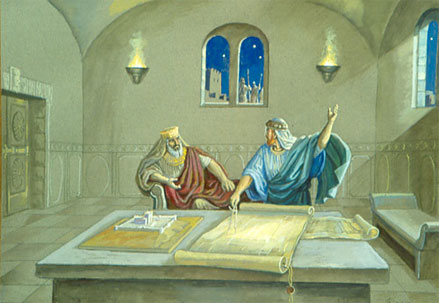
All the names and the numbers in Revelation are symbols based on historical facts. The names are easy. Jezebel, Antipas, Balaam… But we mathematical moderns have trouble taking numbers as symbols. We are only interested in descriptions, not relationships. In the Bible, symbols describe relationships. As David Chilton observes in The Days of Vengeance [PDF], the symbolic value of someone or something is not a description of its nature, but a description of its relationship to someone or something else. Hence, as Jordan observes, Satan is both a dragon and a serpent in Revelation 12. He is a serpent to the Woman and a dragon to her children. Continue reading
3 comments | tags: 666, Balaam, David, Jezebel, Millennium, Peter Leithart, Revelation, Temple, Typology | posted in Biblical Theology, The Last Days
Sep
16
2009

or Why Four Horsemen but Seven Seals?
“…the Egyptians are men, and not God; And their horses are flesh, and not spirit.” Isaiah 31:3
One of the three laws for Israelite kings was a command against multiplying horses and chariots—especially Egyptian ones. Solomon’s horse trading was, for a nation with a miraculous escape ON FOOT, in the eyes of the Lord, just like the faithless behaviour of the Hebrews in the wilderness. It’s always better to dwell in a tent with God than in a palace with the devil. Solomon’s kingdom of chariots and oppression became a new Egypt. By the end of the era, the pigs ruled the farm.
Continue reading
Comments Off | tags: Chariots, David, Egypt, Four Horsemen, Isaiah, Lampstand, Psalms, Solomon, Zechariah | posted in Biblical Theology, The Last Days, The Restoration Era
Sep
1
2009
“…that you may become blameless and harmless, children of God without fault in the midst of a crooked and perverse generation, among whom you shine as lights in the world” Phil. 2:15
Acacias, not Mulberries
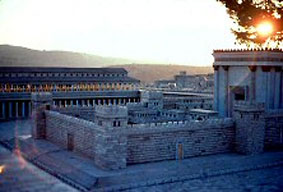 So, acacia wood is at the heart of the Holy furniture. The Tabernacle is a wilderness world glorified by Spirit-filled men and brought into the tent of God,[1] under the wing of Boaz, under the friendly firmament of a new Covenant, under the great tree that grows to shelter the nations.
So, acacia wood is at the heart of the Holy furniture. The Tabernacle is a wilderness world glorified by Spirit-filled men and brought into the tent of God,[1] under the wing of Boaz, under the friendly firmament of a new Covenant, under the great tree that grows to shelter the nations.
Continue reading
Comments Off | tags: AD70, Angels, David, Jewish war, Josephus, Luke | posted in Biblical Theology, Quotes, The Last Days
Aug
27
2009
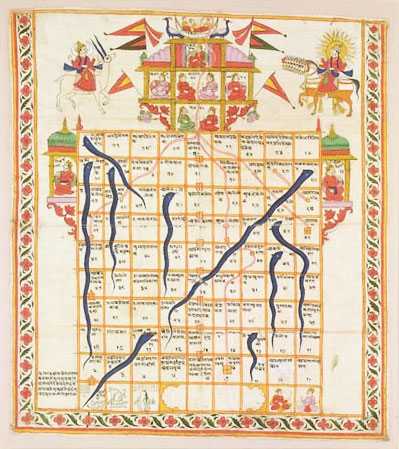
“…when the blood goes up, the Spirit comes down.”
The battle between the Son and the serpent rages throughout the Old Testament. Every time the Lord renews the Covenant, Satan is ready with a counterfeit. God uses the phonies to test and purify His people, wipes the failures off the slate, then starts again.
Aaron and Jeroboam set up patently false worship in their golden calves. But false worship in the guise of true was much more difficult to discern, especially when it usurped the exact location of the true. When the Lord took Ezekiel to the Temple as a legal witness, it was a whitewashed tomb. He dug through the wall and discovered that it was a house of hypocrisy, the synagogue of Satan. All that remained of Israel’s witness to the nations was a thin veneer.
Continue reading
Comments Off | tags: David, Ezekiel, Herod, Incense Altar, Jacob, Satan, Saul, Tabernacle, Temple, Totus Christus, Wormwood | posted in Biblical Theology, The Last Days
Aug
7
2009
or Having No Controversies With God
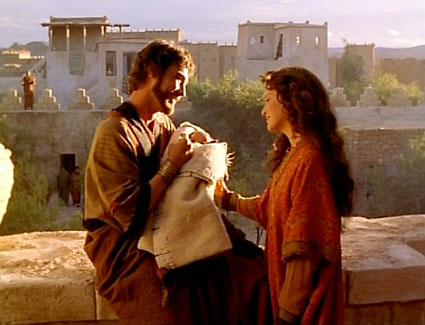
The devil hates confession. It breaks his power over us. He would rather have us confine ourselves behind the bars of our own private Sheols than get right with God.
Why is confession so powerful? Because it is judicial. It is an application of the knowledge of good and evil. Continue reading
6 comments | tags: Bathsheba, David, Feasts, James Jordan, Nathan, Peter Leithart, Saul, Solomon, Systematic typology | posted in Biblical Theology, Christian Life, Quotes, Totus Christus
Jul
28
2009

How smart is this Book?
As discussed, if we begin with Saul’s anointing by Samuel, subsequent events follow the Feasts outline. Saul’s failure to kill Amalek is at Pentecost and his failure to defeat Goliath is at Atonement.
BUT… if we begin with David’s secret anointing by Samuel, subsequent events also follow the Feasts. This time, however, David’s slaying of Goliath is at Pentecost (the serpent/beast in the wilderness). Guess what’s at Atonement?
Continue reading
1 comment | tags: Amalek, Bible Matrix, Circumcision, David, Eglon, Ezekiel, Feasts, goliath, High Priest, Saul, Sidon, Systematic typology, Tabernacles, Tyre | posted in Biblical Theology
Jul
27
2009
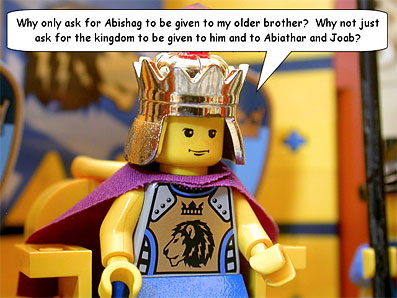
Eli’s corrupt priesthood came to an end when the Ark was taken by the Philistines. Saul’s corrupt kingdom came to a full end when the Ark returned (hence Michal’s barrenness). The last of Eli’s priesthood (Abiathar) was exiled when Solomon’s government began. Solomon’s kingdom was a new firmament (1 Kings 10:19). Isaiah, however, saw it being rolled up like a scroll (Is. 34:4).
Continue reading
Comments Off | tags: Abiathar, AD70, Ark of the Covenant, Caiaphas, Cyrus, David, Eli, Feasts, High Priest, Literary Structure, Saul, Solomon, Systematic typology, Zechariah | posted in Biblical Theology, The Last Days
Jul
26
2009

“In the sweat of your face you shall eat bread till you return to the ground…” (Genesis 3:19)
The book of Judges continually uses the imagery of the crushing of the heads of the Lord’s enemies, whether this is literal skulls or heads of state. The Bible makes a big deal of heads and bodies, whether this is the sacrifices picturing the totus Christus, or His rival, Gog and Magog.
Continue reading
Comments Off | tags: Atonement, David, Gethsemane, goliath, High Priest, Moses, Typology, Uzziah | posted in Biblical Theology
Jul
25
2009
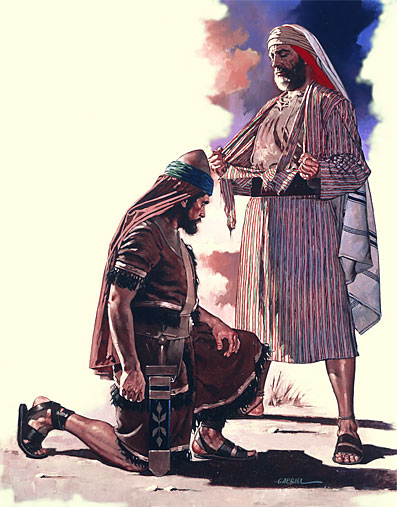
or Worship-styles of the Bitter and Twisted
Under Rehoboam, Solomon’s kingdom became even more like Egypt. Solomon had imposed greater taxes upon his people than were appropriate, and his son Rehoboam took this to the extreme. So the Lord brought about a new Exodus, with Jeroboam as a kind of Moses. David felt guilty for cutting the corner off Saul’s robe — ie. grasping at Saul’s symbol of office — but to Jeroboam the prophet gave ten of the twelve pieces of his robe, the ten northern tribes.
Continue reading
Comments Off | tags: Aaron, David, Egypt, Golden, Jeroboam, Moses, Saul, Solomon | posted in Biblical Theology, Christian Life
Jul
16
2009
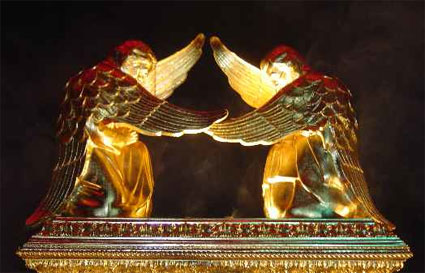
“And she saw two angels in white sitting,
one at the head and the other at the feet,
where the body of Jesus had lain.”
- John 20:12
Two Witnesses
The father of the English backpacker who was lost in the Blue Mountains wrote in the visitors book at the hotel where he stayed. He wrote that he was going briefly back into the bush to carve a memorial to his son into one of the rockfaces. Thankfully, as he waited for his flight home to the UK, his son walked out of the wilderness yesterday suffering from hunger and exposure, but alive. As I have discussed in this series [1], the Bible is full of memorials to important events.
Getting God’s people out of the wilderness is a legal procedure. A minimum of two witnesses is required. First, there are two preachers who spy out the enemy and warn them of impending judgment. The feast pattern consistently puts this at “Trumpets”, which helps us identify some of its more subtle appearances:
Continue reading
Comments Off | tags: cherubim, David, Lot, Moses, Stigmata, Two witnesses | posted in Biblical Theology, The Last Days



































